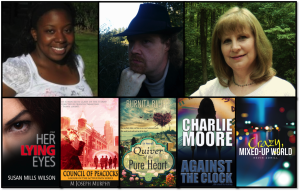This product will haunt your lips forever. As seen in an advertisement for lip butter:
![]()
“Supernatural” is a word, which is why software probably didn’t pick it up. Be careful with your spelling!
This product will haunt your lips forever. As seen in an advertisement for lip butter:
![]()
“Supernatural” is a word, which is why software probably didn’t pick it up. Be careful with your spelling!
by Anita Stratos, Proof Positive editor
Picture this: you’re craving apple pie – one of those “just gotta have it” days – so you go to your favorite café and order up a slice.
Your mouth waters when the server puts your pie in front of you, but when you look closer, you see cranberries, blueberries and pecans mixed with a few apples inside a coconut crust.
“What’s this?” you ask your server with disappointment. “I just wanted a simple apple  pie.”
pie.”
“That’s our pastry chef’s version of apple pie,” she answers. “He likes to stretch his creative culinary muscle.”
Do you think you got what you ordered? Or did you get a more complex dessert, a berry-apple-nut pie with a unique crust? The chef promised apple pie on the menu, but he loaded it up with lots of other things and topped it off in a nontraditional way.
While that gourmet pie might be delicious and welcome on any other night, this time you wanted apple pie and trusted what was written on the menu. So even though the recipe might win a James Beard award, it’s most unwelcome and unappreciated by you at this moment.
Two things went wrong here, and the same things can go wrong with your writing, too.
First, don’t promise something in your title, cover image, or book blurb that you don’t deliver in your story. A book blurb that describes a fantasy novel but delivers a romance is bound to get bad reviews. Your writing may be superb, but you attracted the wrong audience.
The first takeaway: Don’t write “apple pie” on the menu when you’re crafting a multi-berry-apple-nut coconut-crusted pie.
Second, write your prose in a way that best serves your story, not in a complex way that doesn’t match the story or reflect something within the book or character(s). Unnecessarily complex writing gets very tiresome very quickly, slows readers down, and could sound pretentious.
The second takeaway: Serve apple pie to people who love apple pie, and save the gourmet blends for a different audience.
Dearest authors,
I’ve heard the question time and time again: what qualifies me to be an editor and own an editing company? I’ve gotten many questions about my education and my experience, so here’s a video in which I talk about all of it, from my alma mater (Lebanon Valley College) and college jobs to my real-world experience. While I was at it, I filmed some footage of my college campus and the buildings I spent most of my time in, going to classes, studying, and working.
I hope you enjoy learning a little more about me, and please feel free to ask any other questions you may have about Proof Positive!
– Owner of Proof Positive, Christie Stratos
(If you cannot see the video on this page, please click here: https://youtu.be/K3JrSv6zL5I)
Announcement: Proof Positive’s Facebook page has reached over 100 likes! We’re so happy to share our advice and friendship with you that we’re giving away a $25 Amazon gift card through Rafflecopter this week. Just visit Proof Positive’s Facebook page and enter in multiple ways to win. This contest ends Sunday night at midnight Eastern Time.
Thank you again for your support!
Get Down With The Awethors co-creator D.M. Cain graciously suggested that I should do an interview too. As I haven’t published a full book yet, I thought I’d take her up on it in a different way: by telling you why I love all of you.
Indie authors have something really special about them: a sense of community. Why is this so special? Because even though we’re all technically competing with each other, we put that behind us as something that doesn’t need to be acknowledged, as something that is really not the point, and instead we focus on supporting each other. Where else can you find a sense of community that strong?
We exchange books, we give honest reviews, we spread the word on social media for each other, we comment on each other’s work before it’s published. There’s no end to indie authors’ generosity, and it always makes my day to see indie authors working together. Events like the Awethors Facebook event help us not only connect with readers but network with each other. And those relationships last forever.

Just a few of the amazing authors Proof Positive has interviewed and some of the books we’ve worked on!
One of the reasons I started my editing business is to help indie authors succeed, not only through editing but through exposure. I have read some of the most incredible books by indie authors, and I’ve found that I end up reading bestselling traditionally published books mostly to keep up with publishing trends – not because they’re better. This was a big eye opener for me when I first discovered it, and I hope to help open other readers’ eyes to the fantastic talent right in front of them.
Congratulations to all of you who have had the ambition and courage to publish your own books or even get your start by publishing your own books. I hope to join the ranks of such an awesome group soon.
~~~
 Christie Stratos is an editor and award-winning writer who holds a degree in English Literature. An avid reader of all genres and world literature, Christie reads everything from bestsellers to classics to indies, and is an audiobook reviewer at AudioBookReviewer.com. She is also a writer of short stories, poetry – some of which have already been published – and upcoming novels. She dabbles in all genres.
Christie Stratos is an editor and award-winning writer who holds a degree in English Literature. An avid reader of all genres and world literature, Christie reads everything from bestsellers to classics to indies, and is an audiobook reviewer at AudioBookReviewer.com. She is also a writer of short stories, poetry – some of which have already been published – and upcoming novels. She dabbles in all genres.
Connect with Christie
Author website and blog
Twitter
Google+
Pinterest
Goodreads
YouTube
LinkedIn
AudioBookReviewer profile (scroll down!)
Connect with Proof Positive
Facebook
Twitter (same as my personal one!)
Google+
LinkedIn
AUTHORSdb
by Anita Stratos, Proof Positive Editor
I have a confession to make. I’m a binge word writer. I tend to binge on certain words or phrases when writing a first draft like they were my favorite flavor of ice cream. In fact, if the first draft of my writing was ice cream, I’d weigh 500 pounds by now.
That’s because I tend to use a particular word or phrase (or both) repeatedly, as if it’s the only way to describe a certain attitude, action, feeling, whatever. In one first draft, “raised eyebrows” were flying all over the fictitious town; in another, “sideways glances” stole the scenes. Yikes.
The binge words that attach themselves to my brain are different with every manuscript I write. For some reason, different stories bring out different binges. So it’s not like I can just watch out for a particular word or phrase with each manuscript. It’s always a surprise binge – the ice cream attacks me rather than me attacking it.
Train-of-thought writing is like that for me. And while anything goes in a first draft, those repetitions have to be replaced by more creative terms during the revision process.
Repetitions aren’t always obvious during the writing process because I’m so focused on the overall work or so engrossed in writing a scene. And that’s what’s most important with a first draft – getting those thoughts on paper without stopping to edit (something particularly difficult for me; the editor in me always tries to strong-arm the writer in me). But when rereading during that first revision, those binges pop off the page like hot pink Mexican jumping beans.
And that’s when the real work begins. Because sometimes a binge word just seems so perfectly suited in each and every place it appears that it’s hard to imagine any other word doing as good of a job.
At that point I have to step back from the writing and sometimes even act the dialogue or situation out, which can really help open the door for a better descriptive. In fact, sometimes the entire scene can benefit from my little impromptu plays because another dimension to the story or scene may reveal itself, or a character may surprise me with a new attitude or perspective.
You’re probably thinking, “Why doesn’t she just use a thesaurus?” Well, I do use an expanded thesaurus, but it still doesn’t always give me what I need, especially when it comes to phrases. But as a last resort, I’ll check the words it offers just in case it jumpstarts my brain.
And if that doesn’t work, I send my revised, best-as-I-can-get-it draft complete with binge words to my editor and let her work it out. 😉 (Thanks, Christie!)
Writing groups are great – there’s nothing better than spending time with people who have the same desire to write as you do and understand the writing life.
Everyone brings something new to the table, whether it’s an opinion, something they learned in a class or at a writing conference, deeper insight into publishing – whatever it is, the takeaway can be extremely helpful.
But it can also stop some writers in their tracks. It happened just recently to a writer friend of mine. We’ll call her Zoe for the purpose of this post.
She was going full steam on a mystery novel that she was really excited about and having a great time writing. One week she decided to submit a chapter to her writing group for a critique and was very excited to get their input and reactions.
As expected, she got a lot of different opinions, suggestions, and ideas. Stimulated and motivated by all the helpful insights, she returned home with her notes and went to work on her revisions.
The next month Zoe resubmitted the revised chapter. A couple of members who were absent at the last meeting were present this time. Their critiques were in direct conflict with the ones she’d received the previous month, but they were just as strongly confident that their way would improve the book. And some of the members whose suggestions she’d taken didn’t quite care for her rewrites. They wanted it to sound their way. In fact, one went so far as to try to change her voice, while another didn’t like the idea of which character she killed off. Yet a third felt the body should be found already deceased because she didn’t like books with any kind of violence, and she was adamant about that point.
This all took a bit of a toll on Zoe. While she welcomed and felt initially stimulated by all the input, she found that when she was considering all the new suggestions, she started feeling confused and overwhelmed. She lost interest in the book and turned to an entirely different hobby for a while.
When she finally confided in me about her conundrum, I reminded her that this was her book and no one else’s. Everyone has an opinion, a theory, or a preference – even bestselling authors have their detractors. And some of them have dealt with editors who tried to change their voice or story direction as well. I told her she needed to weigh the advice she was getting and decide what worked and what didn’t for her manuscript.
You, as the author, have the final word on your manuscript. These are your characters, your situations, and your story written your way. Take the suggestions that work for your manuscript and discard the rest. People give lots of well-intentioned critiques, but the story is ultimately yours.
I’m happy to say that Zoe’s manuscript is back on track and now almost complete. Her enthusiasm has returned, and she’s learned how to manage the input she gets from her writing group members.
So listen to the critiques but hear them as suggestions, not definitive answers, and never let them get in the way of your writing. The most important opinion is yours.
“But Your Honor, I intended to help that little old lady across the street. Her purse handle just happened to loop over my arm, and I didn’t realize it was there until I was several blocks away and that cop tackled me!”
Do you think any judge in the world would believe that statement? More importantly, do you think he even cares about the thought process or supposed intention the defendant had? No? Well, the same thing goes for writing – readers are your judges, and they don’t know or care about your intentions, they only know and care about what’s actually written on the page.
And since the only reality your readers know is what they read, you have to make your intentions perfectly clear in the written word. Readers can’t stop to think about what you  may have intended when a scene or sentence doesn’t quite make sense or fit with a character’s personality or situation. Nor should they have to. And they’re not mind readers either.
may have intended when a scene or sentence doesn’t quite make sense or fit with a character’s personality or situation. Nor should they have to. And they’re not mind readers either.
Sometimes when we’re writing, we’re so in touch with our characters and their situations that we don’t clarify our intentions in a scene well enough.
Have you ever had a teacher whose lectures could only be understood by someone already knowledgeable in the field, while those of us on the “outside” couldn’t grasp their meaning? Or read instructions that skipped over the details and assumed the user would just “get it”? I think we’ve all experienced at least one of these things; personally, I’ve been on the receiving end of both. And it’s very frustrating.
Writers hire editors to take an objective look at their work before it’s published – at that point, the editor is one of your first readers, so if something is unclear or confusing to her/him, it will most likely be unclear to your future readers as well.
An editor’s job is to point out these problems within a story and suggest a better way.
A writer’s job is to take that point constructively and seriously consider the possibility that it needs modification in order to be easily understood or fit with the rest of the story.
But sometimes a writer is so married to their work that they become defensive about every line, even saying that they think readers will understand their intentions that aren’t written or just allow for incongruous scenes. If you, as a writer, hear yourself saying that, STOP. While the final decision always belongs to the writer as to how the book is written, it serves your book – and your readers – best if you consider the possibility that your intentions are not coming across in your writing.
The upshot: unless you’re writing experimental literature in which readers expect and want to spend time figuring things out, your words need to clearly convey your intentions, not suggest or skirt them.